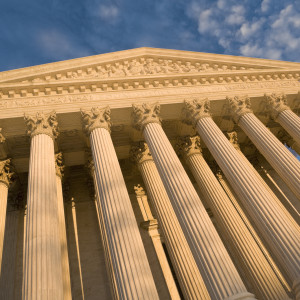Conservatives may soon win a big U.S. Supreme Court victory on affirmative action in college admissions, with eight of the nine justices set to hear oral arguments Wednesday in Fisher v. University of Texas.
The case revolves around Abigail Fisher, a white woman who was rejected from the University of Texas, Austin seven years ago. Fisher says it was because of her race. The university says it was because of her academic record. What the court decides could have huge ramifications for college admissions practices everywhere, and conservatives are sounding optimistic about the outcome.
“Let’s just say the odds for UT aren’t very good,” said Cato Institute adjunct scholar Andrew Grossman during an event at the libertarian think tank Monday.
Part of what Grossman knows is that Justice Anthony Kennedy, the court’s swing vote, is highly skeptical of affirmative action programs. He believes in promoting student body diversity, but not through quota systems and ideally using factors other than race.
The background in this particular case is that Fisher didn’t qualify for UT’s “Top 10 Percent Plan,” whereby all Texas students graduating in the top 10 percent of their high school class are guaranteed seats. As a result, her application was evaluated on a series of “holistic” measures, including race.
Liberals defend this practice as vital to student body diversity, as John Paul Schnapper-Casteras of the NAACP Legal Defense Fund did at Monday’s Cato event. He said UT has “a very modest plan by which race is a factor of a factor” and argued that the school’s past experience without “race-conscious” admissions was awful.
“It did not work. In UT’s own words, it led to an immediate and glaring decline in enrollment among underrepresented minorities,” Schnapper-Casteras said.
Yet conservatives have reason to be optimistic, both because Kennedy has never upheld an affirmative action program and because liberal Justice Elena Kagan is recusing herself. (The U.S. Department of Justice worked on the case when she was solicitor general.)
For these and other reasons, Grossman said, “There’s no way that this mess of a program passes muster with Justice Kennedy, unless he repudiates basically everything he’s ever written about affirmative action.”
Assuming that’s truth, one remaining question is how broadly applicable the court’s decision will be.
“Striking down the Texas system would be a major ruling, but if that is all the Fisher sequel does, its effect would be limited,” wrote Supreme Court reporter Adam Liptak in the New York Times Tuesday. “On the other hand, it would not take much effort to write a broader decision, one that would matter nationwide. Such a decision, echoing Kennedy’s 2003 dissent, would require exploration of race-neutral mechanisms before race-conscious ones are permitted. That would open a new chapter in the legal history of race and education.”

